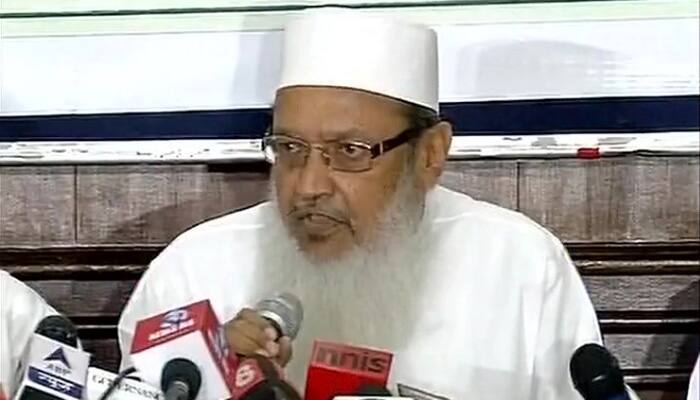New Delhi: Following the Centre's criticism of triple talaq in the supreme court, the Muslim Personal Law Board on Thursday decided to boycott the Uniform Civil Code, saying that India's diversity of cultures needs to be respected.
“The Uniform Civil Code is not good for this nation. There are so many cultures in this nation which have to be respected,” Hazrat Maulana Wali Rehman of the Muslim Personal Law Board (MPLB) said.
He alleged that the commission is not independent but working as a government body. “We will boycott the law commission, the law commission is biased,” Rehman said.
Also Read: 'Triple talaq implicates injustice on Muslim women, has no relation with any religion'
“We are living in this country with an agreement held by the constitution, which allowed us to practice our religion,” he said.
“Muslims have equally participated in India’s freedom struggle, but their participation is always underestimated.
"In America, everyone follows their personal laws and identity. How come our nation doesn't want to follow their steps in this matter?," he asked.
He slammed the Modi government, saying it is using the uniform civil code to divert attention from its failures.
“They cannot protect India’s borders and seem to be fueling internal strife,” he said.
Also Read: Muslim women in Islamic countries enjoy more equality than in India: Maneka Gandhi
The members also claimed that Hindus practised polygamy more than Muslims and that the divorce rates were also high.
The MPLB’s reactions come after the law commission released a questionnarie on October 7 which included 16 questions regarding the relevance and need of UCC, its impact on women’s development, triple talaq among other things.
The questionnaire comes in the backdrop of a case being heard in Supreme Court regarding the relevance of triple talaq.
The case was filed by one Shayada Bano who challenged the practice and her petition was later merged with similar petitions by other organisations including the Bhartiya Muslim Mahina Andolan.
In its affidavit, the Centre had submitted in the apex court that triple talaq is not an integral part of Islam.
However, Muslim women have welcomed the government's stand that triple talaq violated the women's equality and must go.
"We ... whole-heartedly welcome the stand taken by the government in the Supreme Court," 16 women activists said in a joint statement.
"We welcome the clear statement in the (government) affidavit that practices such as Triple Talaq, Nikah Halala and polygamy are violative of womens' equality and dignity and therefore need to be abolished."
The statement said Triple Talaq took place in gross violation of Quranic injunctions and values of justice and equality enshrined in the Indian constitution.
"We welcome the statement that gender equality is non-negotiable... There can be no progress without gender equality and justice.
"We also welcome the stand that the fact that these practices are legally regulated in several Muslim countries indicates these are not essential practices in the Islamic religion," the statement said.
"The Constitution allows for personal laws with the objective of upholding diversity and pluralism in our country. But it nowhere sanctions violation of the principles of gender justice."
Also Read: Muslim women hail government move on Triple Talaq, say it violated issue of women's equality
The women said that Muslim women were entitled to legal justice just as Hindu women had moved towards justice through the Hindu Marriage Act, 1955 and the Hindu Succession Act, 1956.
















